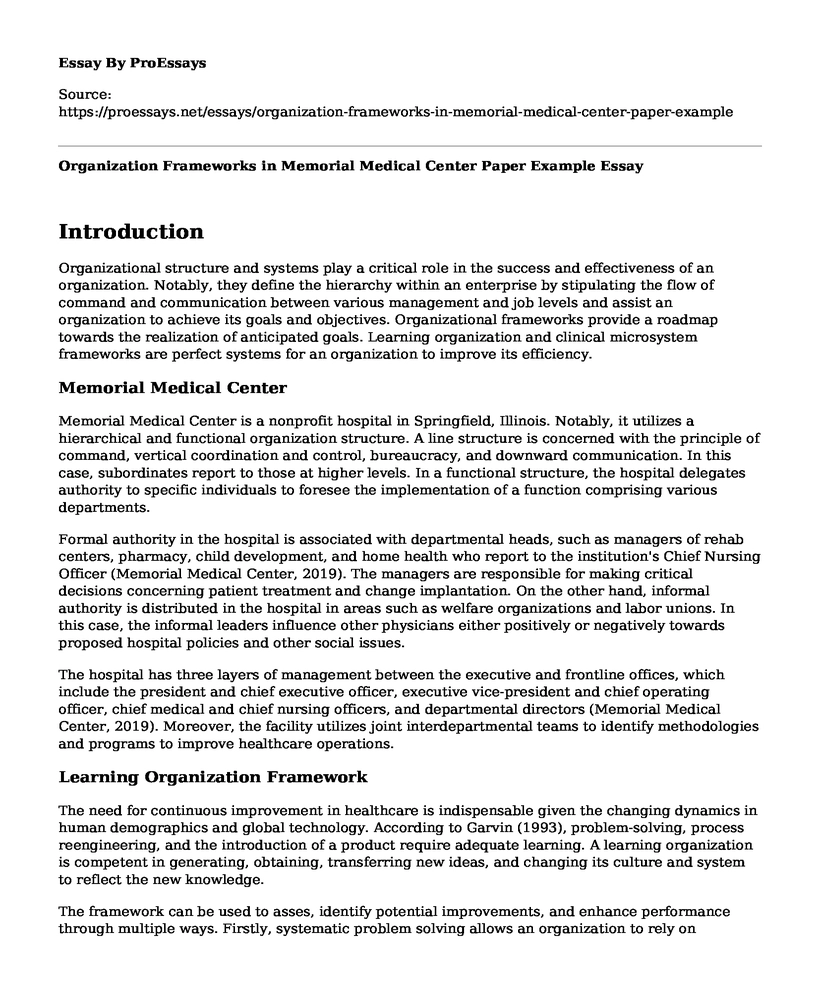Introduction
Organizational structure and systems play a critical role in the success and effectiveness of an organization. Notably, they define the hierarchy within an enterprise by stipulating the flow of command and communication between various management and job levels and assist an organization to achieve its goals and objectives. Organizational frameworks provide a roadmap towards the realization of anticipated goals. Learning organization and clinical microsystem frameworks are perfect systems for an organization to improve its efficiency.
Memorial Medical Center
Memorial Medical Center is a nonprofit hospital in Springfield, Illinois. Notably, it utilizes a hierarchical and functional organization structure. A line structure is concerned with the principle of command, vertical coordination and control, bureaucracy, and downward communication. In this case, subordinates report to those at higher levels. In a functional structure, the hospital delegates authority to specific individuals to foresee the implementation of a function comprising various departments.
Formal authority in the hospital is associated with departmental heads, such as managers of rehab centers, pharmacy, child development, and home health who report to the institution's Chief Nursing Officer (Memorial Medical Center, 2019). The managers are responsible for making critical decisions concerning patient treatment and change implantation. On the other hand, informal authority is distributed in the hospital in areas such as welfare organizations and labor unions. In this case, the informal leaders influence other physicians either positively or negatively towards proposed hospital policies and other social issues.
The hospital has three layers of management between the executive and frontline offices, which include the president and chief executive officer, executive vice-president and chief operating officer, chief medical and chief nursing officers, and departmental directors (Memorial Medical Center, 2019). Moreover, the facility utilizes joint interdepartmental teams to identify methodologies and programs to improve healthcare operations.
Learning Organization Framework
The need for continuous improvement in healthcare is indispensable given the changing dynamics in human demographics and global technology. According to Garvin (1993), problem-solving, process reengineering, and the introduction of a product require adequate learning. A learning organization is competent in generating, obtaining, transferring new ideas, and changing its culture and system to reflect the new knowledge.
The framework can be used to asses, identify potential improvements, and enhance performance through multiple ways. Firstly, systematic problem solving allows an organization to rely on scientific data and methods to diagnose a problem as opposed to assumptions (Garvin, 1993). Secondly, continuous experimentations of new knowledge using systematic methods are crucial since it leads to the development of new opportunities through innovative discoveries. The ability to solve problems amicably and inventions permit an organization to improve its systems and utilize opportunities; thus enhancing performance.
Clinical Microsystems
Clinical microsystems in healthcare are characterized by small groups of professionals working together on a routine to provide care to a specific population of patients (Sabino, Friel, Deitrick, & Salas-Lopez, 2009). The clinical microsystem framework leverages the frontline teams by providing them with adequate knowledge concerning their work and interdependence with the corporation to improve their efficiency. For example, while determining the cause of head injuries after cardiac surgery, a hospital may focus on a microsystem made up of the theater, cardiothoracic surgeon, scrub nurse, and anesthesiologist. The members can collect data concerning the source of injury and develop an integrated quality enhancement team. Moreover, the team can perform various tests and experiments to correct the problem using the data. Later using information and new knowledge gathered the microsystem could apply their findings to reduce the injuries. Notably, microsystems are essential in improving the experience of patients at a micro-level, which later influences overall organization performance.
Conclusion
Overall, performance improvement in healthcare is ideal for enhancing patient experience in hospitals. Clinical microsystem and learning organization frameworks provide hospitals with an opportunity to identify areas of development by focusing on quality enhancement of frontline units. Hierarchical organization structure-applied by Memorial Healthcare Center-allows proper flow of information, authority, and accountability in healthcare.
References
Garvin, D. A., (1993). Building a learning organization. Harvard Business Review. Retrieved from https://hbr.org/1993/07/building-a-learning-organization
Memorial Medical Center (2019). About. Retrieved from https://www.memorialmedical.com/about/quality
Sabino, J. N., Friel, T., Deitrick, L. M., & Salas-Lopez, D. (2009). Striving for cultural competence in an HIV program: the transformative impact of a microsystem in a larger health network. Health & Social Work, 34(4), 309-313. https://doi.org/10.1093/hsw/34.4.309
Cite this page
Organization Frameworks in Memorial Medical Center Paper Example. (2022, Dec 10). Retrieved from https://proessays.net/essays/organization-frameworks-in-memorial-medical-center-paper-example
If you are the original author of this essay and no longer wish to have it published on the ProEssays website, please click below to request its removal:
- Health: Benefits of Rope Skipping Essay Example
- Diagnosis, Treatment and Complication of Deep Carious Lesions and Pulp Exposure
- Whether Blacks Have Higher Rates of Hypertension as Compared to White Races?
- Steps to Transform Teamwork Essay
- Essay Sample on Brand Positioning: Own a Conceptual Place in Customers' Minds
- Essay on Smoking Ban in Public Housing Violates Rights: HUD Authority Questioned
- Disruptive Tech: How It's Transforming Organizations & Consumers - Essay Sample







